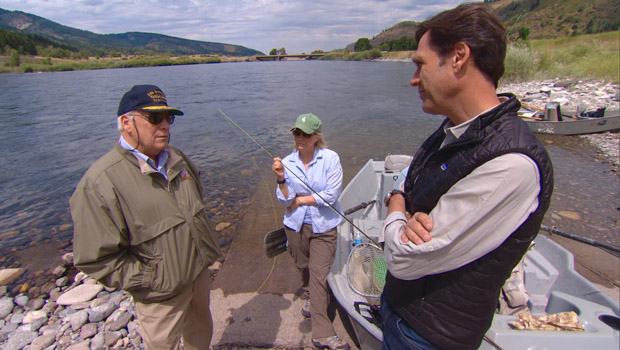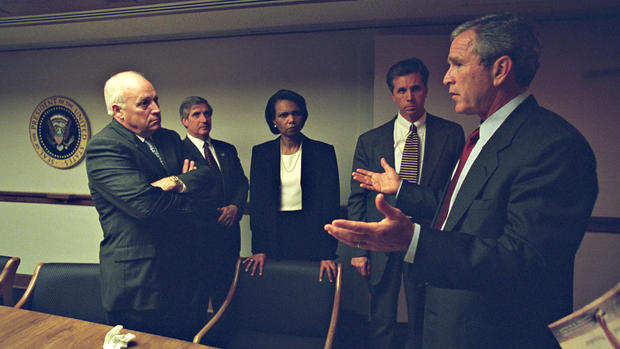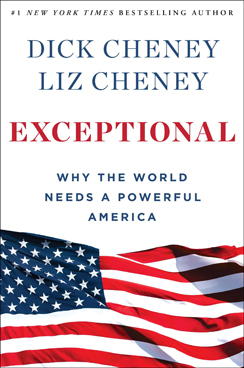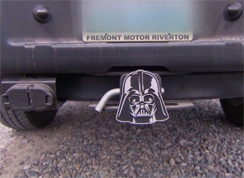Sharp talk from Dick and Liz Cheney
No need to ask former Vice-President Dick Cheney and his daughter Liz what the nature of their family business might be. It's politics, of course ... politics of a famously outspoken sort. Lee Cowan recently met with them on their own home ground:
Lee Cowan caught up with the former Vice President in one of his favorite spots -- drifting down the south fork of the Snake River in Idaho, fly rod in hand, matching wits with the trout.
"Got him!" he said, before releasing him again. "Cutthroat!"
"No matter what other worries or problems you may have, or are dealing with, you really focus on what you're doing and put your other cares aside. They don't count as much when you're out here."
Not too long ago, this kind of retirement for Dick Cheney -- not far from his home in scenic Jackson Hole, Wyoming -- looked pretty iffy. His failing heart used to get almost as many headlines as he did.
But in 2012, this grandfather of seven got a heart transplant -- and suddenly, everything changed.
"I've just been back in for my three-year checkup, and it's nothing short of miraculous," he said.
At 74, he's regained the look of his days in office, reminders of which popped up again last month with the release of previously unseen photos taken on September 11, 2001. They show Cheney first dealing with the crisis in the White House bunker, then being whisked away to that now-famous "undisclosed location."
"It was a remarkable day, a tragic day, in terms of the loss of life and the extraordinary set of circumstances we had to face with," he said.
And a day that shaped one of the most controversial Vice Presidencies in history.
"How did that day change you personally?" Cowan asked. "Not from a policy standpoint, but change you?"
"Well, it's been alleged, by some of my friends, that 9/11 did change Cheney," he replied. "That when he was Secretary of Defense under the first Bush administration, he was a warm, pleasant, lovable fellow, and he became more of a hard rock afterwards. And I think it's probably true. It changed -- well, it changed the way I looked at the world."
The way he looks at the world is pretty well known by now; Dick Cheney is unapologetically hawkish.
He was an early critic of the Obama administration's national security policies, especially the troop withdrawals from Iraq and Afghanistan.
"The mindset is hard for me to understand," he said. "I think we have to recognize that it's a dangerous world, that it's more dangerous than it has been before, and that those threats out there we're faced with are increasing while we strip ourselves of the ability to deal with it."
Cheney is renewing his criticism of Mr. Obama with the help of his daughter, Liz, a former State Department official and one-time Senate candidate. In their upcoming book, "Exceptional," to be published by Simon & Shuster (a division of CBS), they accuse President Obama of retreating from the world's problems, diminishing America's power as the threat of terrorism rises.
It is, Cowan noted, "a pretty harsh criticism of a sitting president."
"Well, it is a necessary criticism, I think is the way we both feel about it," said Liz Cheney. "It's not an attack on him as a person, but it's very much sort of raising the alarm about the policies."
Take, for instance, their criticism of the president's recent nuclear deal with Iran -- a country Cheney's boss famously included in his "Axis of Evil."
"You say of the deal that the Obama agreement will one, lead to a nuclear-armed Iran; two, lead to a nuclear arms race in the Middle East, and three, the first use of a nuclear weapon since Hiroshima and Nagasaki. That's a pretty daunting prediction," said Cowan.
"We say it may well lead to the first use of a nuclear weapon since Hiroshima and Nagasaki," said Liz. "This deal makes war more, not less likely."
"Think about what kind of a regime it is," said Dick Cheney. "They've violated virtually every agreement they've ever been a party to. I don't think they can be trusted. I think they've demonstrated that repeatedly."
The book is an expanded version of an op-ed the Cheneys wrote for the Wall Street Journal last year, where they laid out an argument that many of the GOP presidential hopefuls are now campaigning on: that the rise of the so-called Islamic State is Mr. Obama's fault.
Cowan asked, "Are you really laying the spread of ISIS at the President's feet?"
"I think the spread of ISIS was the direct result of the vacuum that was created when the Obama administration withdrew all our forces from Iraq," Cheney said. "We turned out backs on Iraq. We had Iraq in good shape by the time we left office. Even Obama said as much."
Initially, it was President Bush who agreed with a troop withdrawal deadline, although he did so reluctantly. Prime Minister Nouri al-Maliki had objected to the idea of any U.S. troops staying beyond 2011.
"While you talk about the problem being that there was no stay-behind force, some would argue that the real problem was that we went in to Iraq in the first place," said Cowan.
"Well, I'm well known as somebody who has strongly defended that as the right thing to do. And I still believe that," he replied.
"You wouldn't change anything?"
"No," Cheney said. "There was widespread support at the time, and it was justified."
That support was based largely on the administration's argument that Iraq possessed weapons of mass destruction -- an argument that later proved to be wrong. That false premise became a key issue in Mr. Obama's 2008 presidential campaign.
"Does the President get any credit for trying -- while still recognizing the sacrifice that was made -- to end two wars that had gone on longer than even you thought they would go on? Does he get any credit for trying to end that?"
"Well, I gave him credit, for example, when they got Osama bin Laden," Cheney said. "But you don't end a war -- if you end a war by just walking away from it, that's victory for the other side."
Some of his fellow Republicans, however, are uneasy with the intelligence policies the Cheneys want the next president to bring back, including the enhanced interrogation techniques that a Senate panel deemed torture.
"First of all, it wasn't torture," Cheney argued. "Waterboarding, for example, 'torture,' that was the most egregious thing we did supposedly in the enhanced interrogation program. It was the most significant source of intelligence for us that we absolutely had to have, and that was on al Qaeda, how big they were, where they were, who their leaders were, what their plans were, and so forth. All of that came out of enhanced interrogation."
"What do you say to those who say, yes, perhaps they worked, but we sacrificed our values in the process?" Cowan asked.
"First of all, I don't believe we sacrificed our values," he said. "I think the number one responsibility of senior public officials is to safeguard the nation."
Nearly seven years out of office, Cheney remains a man not eager to make either apologies or skirt controversy.
"If you're just nothing but warmth and friendliness and so forth, you seriously can't deal with the kinds of issues I've had to deal with over the years, and that I wanted to deal with," he said. "It's almost, I think, if you are criticism-free, then you're probably not doing your job."
For his daughter, that unyielding nature is one of the most appealing things about him.
"I know of no one who has been more courageous and dedicated and honorable than my dad, in terms of being willing to say this is absolutely what we have to do, this is the right thing to do, sometimes when nobody else was willing to do it," said Liz Cheney. "I know, for all of us who love you, the gratitude as Americans that we feel, is matched only by our love for him.
"Don't look at me like that!" she added, touching his shoulder. "Thank you," he said, his matter-of-fact veneer almost cracking for a moment.
Cowan asked Liz, "What's do you think is the most surprising thing about your dad that folks don't know?"
"That the hitch cover on his pick-up truck is Darth Vader," she said.
"It is!" Cheney added, laughing. "I don't know who put it on, I haven't found out yet!"
We checked, and yes, on the back of his black F-350, it's there -- the symbol of the villainous "Dark Side" that even became a bit for Jon Stewart's final show.
Vader: "I am more machine than man. But it has come to my attention that you have been comparing me to Dick Cheney. That seems a bit harsh!"
"You have to have a sense of humor about the business," Cheney said.
His guides back on the Snake River often say Cheney picks the hardest fish to catch in the toughest conditions. The more challenging, the better. His approach to politics seems just as targeted.
Whatever you think of Dick Cheney, he's clearly not ready to hang out the "Gone Fishing" sign for good.
Cowan asked, "What do you want your legacy to be?"
"Oh, I don't know. I think I'll let the historians worry about that," Cheney replied. "I feel like I did the best I could under extraordinary circumstances and I'm satisfied with that."
For more info:
- "Exceptional: Why the World Needs a Powerful America" by Dick Cheney and Liz Cheney (Simon & Schuster); Also available in eBook, Unabridged Audio Download, and Unabridged Audio CD formats



